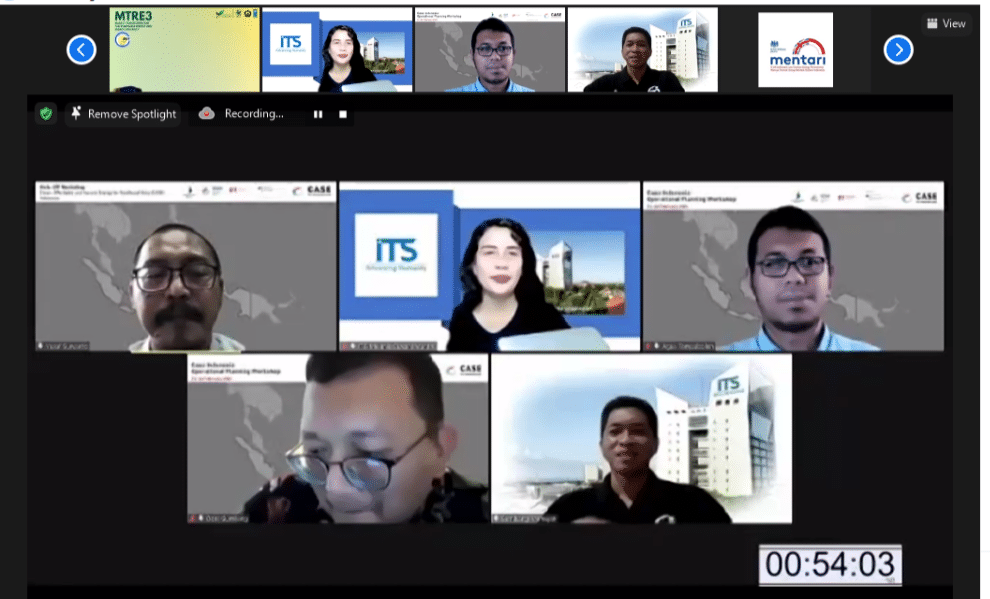CASE (Clean, Affordable, and Secure Energy) project embraces many parties to encourage the energy transition in Indonesia by conducting online discussions within operational planning workshop for 3 days (February, 22-24 2021). Stakeholders from various government agencies, financial institutions, academia, and civil society organizations, shared their opinion and ideas about the activities they have undertaken to contribute to the energy transition.
This meeting was crucial to ensure that CASE activities would later remain aligned and complementing activities that are currently or have been planned by other relevant agencies regarding the energy transition, as well as reflect the inclusiveness of the CASE project.
Currently, the energy transition is deemed as an exclusive topic or only discussed by certain groups. On the other hand, the topic of the energy transition arose because of scientific concerns about the climate crisis that is experiencing and will impact human nature and our ecosystem, so it is important to introduce this process to form collective awareness of measures to avoid the more extreme impacts of the climate crisis through the energy transition, especially in the power sector.
Input and opinion from various parties are also important to see the various constraints and situations experienced by each party and how the project can play a role in CASE in these situations.
From the financial sector, for example, there are still difficulties in providing funding for renewable energy projects because they are hampered by several things, one of which is the risk assessment of renewable energy projects.
“We need to understand the risk of investing in renewable energy, and how to mitigate it, so that this renewable energy project is more bankable,” explained by an executive from one of the banking institutions in Indonesia who was involved in this discussion.
He continued, “In addition, there should be a body that can become a kind of consultant to provide an objective assessment of supply and demand in this sector, especially to answer the question, is this project in line with the government’s development plan? More importantly, how about government support for this particular project? “
The government has not responded to these questions. Several institutions have taken the initiative to find solutions to these questions, but a definite answer from the government in the form of official policies or regulations is still considered important and crucial as a positive signal of government support.
“Institutionally, we already have a target and work plan for 2021 that can be collaborated with the CASE program. Some of them are campaigns to raise awareness from financial institutions and investors about the potential of renewable energy projects, as well as inter-institutional meetings to discuss green recovery and green. jobs, “explained one ministerial official in Indonesia.
“As academics, we are open to being involved in making studies and developing pilot projects of the activities for the CASE project. We also have study groups focused on developing clean energy, so we look forward to having discussions about the activities we can do together,” said a lecturer of Technical University in Indonesia.
All parties agree that synergy is needed from all parties to respond to the issue of providing clean energy that is affordable and sustainable. However, the government still needs to be the initiator who first moves these parties.
“As the title of this project is CASE, Clean and Affordable, if we talk about affordable, it must be related to price and business model. So PLN must find the right business model to provide affordable clean energy for the community, ”said an official from a state-owned company in Indonesia.
This activity was closed by agreeing on a joint commitment from all parties present to make the program agenda for the provision of clean, affordable, and sustainable energy a success. The moderator at the plenary session emphasized that the Ministry of National Development Planning/BAPPENAS really hopes for the cooperation and synergy from each stakeholder invited to the workshop so that the achievement of the project will be good even better, as stated in the tagline “To Mobilize Stakeholders, to Make the Output Better.”
The CASE project is an initiative of the German government, funded by the German Federal Ministry for the Environment, Nature Conservation, and Nuclear Safety (BMU). In general, this program aims to encourage an increase in public understanding of the energy transition issues in Southeast Asia.
The CASE program covers regional working areas in 4 Southeast Asian countries, namely Indonesia, the Philippines, Vietnam, and Thailand. In Indonesia, the CASE program is run by GIZ Indonesia in collaboration with the Institute for Essential Services Reform and the Ministry of National Development Planning / BAPPENAS as government representatives to partner with CASE. Globally, this program is also supported by international consortium partners Agora Energiewende and the New Climate Institute.

